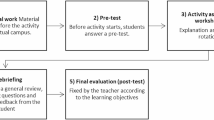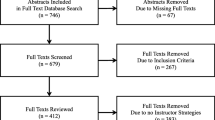Abstract
Improv activities have been shown to increase student engagement, enjoyment, and confidence in higher education classrooms. However, there are few examples of STEM courses designed with dedicated and repeated time allotted to improv activities. We sought to determine the effects of scheduled improv activities on engagement and learning in an upper-level biomedical engineering course. The engineering course was modified to include dedicated class time for implementing improv activities. Student perception of this format and of the activities was assessed via pre- and post-implementation surveys. These surveys focused on student engagement, self-confidence, communication, and comfortability in the classroom in prior courses (pre-implementation survey) and after 4 weeks of improv activities (post-implementation survey). Based on survey feedback, most students thought that the improv activities were helpful in facilitating an engaging and collaborative classroom experience. Students indicated that the improv activities helped improve their general communication skills, and many positively remarked on how the activities brought some energy to the classroom and helped them get to know their peers. Overall, this study suggested that students responded favorably to the improv activities, with several remarking that the activities should be used more in STEM courses. These results demonstrate that improv activities can be successfully implemented in engineering classrooms and could become an important part of the engineering education curriculum.








Similar content being viewed by others
Data Availability
Surveys are available in supplementary information. Other data are available upon request.
Code Availability
Not applicable.
References
Berk RA, Trieber RH. Whose classroom is it, anyway? Improvisation as a teaching tool. J Excell Coll Teach. 2009;20(3):29–60.
Rossing JP, Hoffmann-Longtin K. Improv(ing) the academy: applied improvisation as a strategy for educational development. Improve Acad. 2016;35(2):303–25. https://doi.org/10.1002/tia2.20044.
Spolin V. Improvisation for the theatre: a handbook of teaching and directing techniques. 3rd ed. Evanston: Northwestern University Press; 1999.
Casteleyn J. Playing with improv(isational) theatre to battle public speaking stress. RIDE-J Appl Theatre Perform. 2019;24(2):147–54. https://doi.org/10.1080/13569783.2018.1552129.
Seppanen S, Toivanen T, Makkonen T, Jaaskelainen LP, Anttonen M, Tiippana K. Effects of improvisation training on student teachers’ behavioral, neuroendocrine, and psychophysiological responses during the trier social stress test. Adapt Hum Behav Physiol. 2020;6(3):356–80. https://doi.org/10.1007/s40750-020-00145-1.
Felsman P, Gunawardena S, Seifert CM. Improv experience promotes divergent thinking, uncertainty tolerance, and affective well-being. Think Skills Creat. 2020;35:14. https://doi.org/10.1016/j.tsc.2020.100632.
Schwenke D, Dshemuchadse M, Rasehorn L, Klarholter D, Scherbaum S. Improv to improve: the impact of improvisational theater on creativity, acceptance, and psychological well-being. J Creat Ment Health. 2021;16(1):31–48. https://doi.org/10.1080/15401383.2020.1754987.
Neel N, Maury JM, Heskett KM, Iglewicz A, Lander L. The impact of a medical improv curriculum on wellbeing and professional development among pre-clinical medical students. Med Educ Online. 2021;26(1):5. https://doi.org/10.1080/10872981.2021.1961565.
Huffaker JS, West E. Enhancing learning in the business classroom: an adventure with improv theater techniques. J Manag Educ. 2005;29(6):852–69. https://doi.org/10.1177/1052562905277311.
Balachandra L. The improvisational entrepreneur: improvisation training in entrepreneurship education. J Small Bus Manag. 2019;57:60–77. https://doi.org/10.1111/jsbm.12486.
Moshavi D. “Yes and…”: introducing improvisational theatre techniques to the management classroom. J Manag Educ. 2001;25(4):437–49. https://doi.org/10.1177/105256290102500408.
Rocco RA, Whalen DJ. Teaching yes, and … improv in sales classes: enhancing student adaptive selling skills, sales performance, and teaching evaluations. J Market Educ. 2014;36(2):197–208. https://doi.org/10.1177/0273475314537278.
Robson K, Pitt L, Berthon PR. “Yes, and …”: what improv theater can teach service firms. Bus Horiz. 2015;58(4):357–62. https://doi.org/10.1016/j.bushor.2015.02.002.
Grossman CE, Lemay M, Kang L, Byland E, Anderson AD, Nestler JE, et al. Improv to improve medical student communication. Clin Teach. 2021;18(3):301–6. https://doi.org/10.1111/tct.13336.
Watson K. Perspective: serious play: teaching medical skills with improvisational theater techniques. Acad Med. 2011;86(10):1260–5. https://doi.org/10.1097/ACM.0b013e31822cf858.
Boesen KP, Herrier RN, Apgar DA, Jackowski RM. Improvisational exercises to improve pharmacy students’ professional communication skills. Am J Pharm Educ. 2009;73(2):8. https://doi.org/10.5688/aj730235.
Kaplan-Liss E, Lantz-Gefroh V, Bass E, Killebrew D, Ponzio NM, Savi C, et al. Teaching medical students to communicate with empathy and clarity using improvisation. Acad Med. 2018;93(3):440–3. https://doi.org/10.1097/acm.0000000000002031.
Shochet R, King J, Levine R, Clever S, Wright S. ‘Thinking on my feet’: an improvisation course to enhance students’ confidence and responsiveness in the medical interview. Educ Prim Care. 2013;24(2):119–24. https://doi.org/10.1080/14739879.2013.11493466.
Haroldson EL. Improv games in geoscience courses. J Geosci Educ. 2022;70(2):195–207. https://doi.org/10.1080/10899995.2021.1945404.
Rice-Bailey T. The benefits of improvisational games in the TC classroom. Tech Commun Q. 2021;30(1):63–76. https://doi.org/10.1080/10572252.2020.1754466.
Bottcher A, Worch N, Kamper A, Trescher R, Ieee. Using improvisational theater in team-based teaching activities. IEEE Global Engineering Education Conference (EDUCON). Tech Univ Berlin, Berlin, Germany: Ieee; 2013. p. 356–61.
Morales-Almazan P. Improv practices in mathematics active teaching. Primus. 2022;32(9):1013–28. https://doi.org/10.1080/10511970.2021.1978604.
Acknowledgements
The authors gratefully acknowledge the support of Lisa Kelly and Darren Hoffmann for assistance preparing and navigating the IRB approval process.
Funding
Not applicable.
Author information
Authors and Affiliations
Contributions
RJW: Conceptualization, Methodology, Formal analysis and investigation, Writing—original draft and editing. KSW: Methodology, Investigation, Writing—review and editing, Supervision.
Corresponding author
Ethics declarations
Conflict of interest
The authors have no competing interests to declare that are relevant to the content of this article.
Ethical Approval
Surveys and methodology for this study were approved by the University of Iowa’s Human Subjects Office/Institutional Review Board under the Exempt status.
Consent to Participation
Informed consent was obtained prior to participation in all surveys.
Consent to Publication
Not applicable. All data were collected as anonymized, and no identifying information is found in the manuscript.
Supplementary Information
Below is the link to the electronic supplementary material.
Rights and permissions
Springer Nature or its licensor (e.g. a society or other partner) holds exclusive rights to this article under a publishing agreement with the author(s) or other rightsholder(s); author self-archiving of the accepted manuscript version of this article is solely governed by the terms of such publishing agreement and applicable law.
About this article
Cite this article
Wendland, R.J., Worthington, K.S. Improv Activities in an Engineering Classroom Increase Student Self-Perceptions of Engagement, Adaptability, and Communication. Biomed Eng Education 4, 97–107 (2024). https://doi.org/10.1007/s43683-023-00129-z
Received:
Accepted:
Published:
Issue Date:
DOI: https://doi.org/10.1007/s43683-023-00129-z




